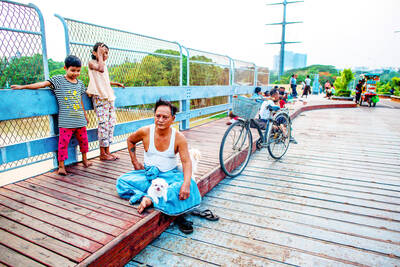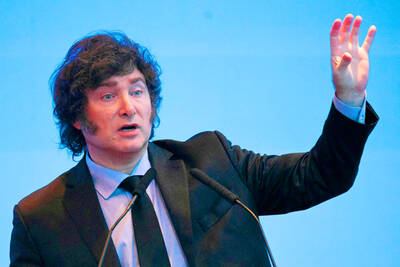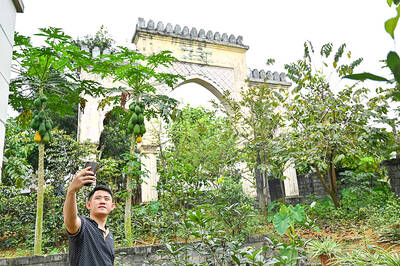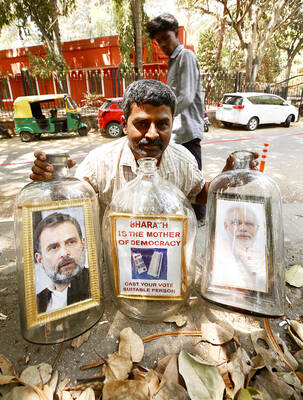French President Emmanuel Macron on Sunday decried his Nazi-collaborator predecessors and rising anti-Semitism, vigorously vowing to stamp out Holocaust denial as he paid homage to thousands of French children sent to death camps 80 years ago for one reason alone — because they were Jewish.
Family by family, house by house, French police rounded up 13,000 people on two terrifying days in July 1942, wresting children from their mothers’ arms and dispatching everyone to Nazi death camps. France honored those victims this weekend, as it tries to keep their memory alive.
For the dwindling number of survivors of France’s wartime crimes, a series of commemoration ceremonies were especially important. At a time of rising anti-Semitism and far-right discourse sugarcoating France’s role in the Holocaust, they worry that history’s lessons are being forgotten.

Photo: Reuters
A week of ceremonies marking 80 years since the Vel d’Hiv police roundup on July 16 and 17, 1942, culminated on Sunday with an event led by Macron, who pledged that would not happen ever again.
“We will continue to teach against ignorance. We will continue to cry out against indifference,” Macron said. “And we will fight, I promise you, at every dawn, because France’s story is written by a combat of resistance and justice that will never be extinguished.”
He denounced former French leaders for their roles in the Holocaust and the Vel d’Hiv raids, among the most shameful acts undertaken by France during World War II.
Over those two days, police herded 13,152 people — including 4,115 children — into the Winter Velodrome of Paris, known as the Vel d’Hiv, before they were sent on to Nazi camps.
It was the biggest such roundup in western Europe. The children were separated from their families; very few survived.
In public testimonies over the past week, survivor Rachel Jedinak described a middle-of-the-night knock on the door, and being marched through the streets of Paris and herded into the velodrome in the shadow of the Eiffel Tower.
She recalled her desperate mother shouting at police. Some French neighbors informed on Jews, others wept as they watched them being corralled like livestock.
Chantal Blaszka’s aunts and uncle were among the children rounded up: six-year-old Simon, nine-year-old Berthe, 15-year-old Suzanne. Their names are now engraved on a monument at a garden where the velodrome once stood, along with about 4,000 other children targeted in the raids.
Photographs of the children hang from tree trunks, the result of years of painstaking research to identify and honor the long-anonymous victims.
Of the children deported from the Vel d’Hiv 80 years ago, only six survived.
“Can you imagine?” Blaszka asked, pointing at the names and shaking her head. “Can you imagine?”
Serge Klarsfeld, a renowned Nazi hunter whose father was deported to Auschwitz, spoke on Saturday in the garden, calling it an “earth-shaking testimony to the horrors lived by Jewish families.”
Klarsfeld, 86, stressed the urgency of passing on memories as more of the war’s witnesses pass on.
Macron on Sunday visited a site in Pithiviers south of Paris where police sent families after the Vel d’Hiv roundup, before sending them to the Nazi camps. A new memorial site honoring the deportees was inaugurated, including a plaque that reads: “Let us never forget.”
The president urged vigilance.
“We are not finished with anti-Semitism and we must lucidly face that fact,” he said. “It is showing itself on the walls of our cities” when they are vandalized with swastikas.
“It is infiltrating social networks ... it inserts itself into debates on some TV shows. It shows itself in the complacency of certain political forces. It is prospering also through a new form of historic revisionism, even negationism,” he added.
Another ceremony was held at the Shoah Memorial in the Paris suburb of Drancy, home to a transit center that was central to French Jews’ deadly journey to Nazi camps. Most of the 76,000 Jews deported from France under the collaborationist Vichy government passed through the Drancy camp.
The Shoah memorial documents the Holocaust, especially for younger generations. This work is especially important at a time when Jewish communities are increasingly worried about rising anti-Semitism in Europe.
The French Ministry of the Interior has reported a rise in antiSemitic acts in France, and said that while racist and anti-religious acts overall are increasing, Jews are disproportionately targeted.
Anxiety has worsened for some since the far-right National Rally party made a surprising electoral breakthrough last month, winning a record 89 seats in France’s National Assembly.
Party cofounder Jean-Marie Le Pen has been convicted of racism and downplaying the Holocaust. His daughter Marine, who now leads the party, has distanced herself from her father’s positions, but the party’s past still raises concerns for many Jews.
It took France’s leadership 50 years after World War II to officially acknowledge the state’s involvement in the Holocaust, when then-French president Jacques Chirac apologized for the French authorities’ role in the Vel d’Hiv raids.
“The policy, from 1942 onward, was to organize the murder of the Jews of Europe and therefore to organize the deportation of the Jews of France,” Paris Shoah Memorial director Jacques Fredj said. “Most of the time, the decisions were made by the Nazis ... but the management was French.”

As the sun sets on another scorching Yangon day, the hot and bothered descend on the Myanmar city’s parks, the coolest place to spend an evening during yet another power blackout. A wave of exceptionally hot weather has blasted Southeast Asia this week, sending the mercury to 45°C and prompting thousands of schools to suspend in-person classes. Even before the chaos and conflict unleashed by the military’s 2021 coup, Myanmar’s creaky and outdated electricity grid struggled to keep fans whirling and air conditioners humming during the hot season. Now, infrastructure attacks and dwindling offshore gas reserves mean those who cannot afford expensive diesel

Does Argentine President Javier Milei communicate with a ghost dog whose death he refuses to accept? Forced to respond to questions about his mental health, the president’s office has lashed out at “disrespectful” speculation. Twice this week, presidential spokesman Manuel Adorni was asked about Milei’s English Mastiff, Conan, said to have died seven years ago. Milei, 53, had Conan cloned, and today is believed to own four copies he refers to as “four-legged children.” Or is it five? In an interview with CNN this month, Milei referred to his five dogs, whose faces and names he had engraved on the presidential baton. Conan,

Le Tuan Binh keeps his Moroccan soldier father’s tombstone at his village home north of Hanoi, a treasured reminder of a man whose community in Vietnam has been largely forgotten. Mzid Ben Ali, or “Mohammed” as Binh calls him, was one of tens of thousands of North Africans who served in the French army as it battled to maintain its colonial rule of Indochina. He fought for France against the Viet Minh independence movement in the 1950s, before leaving the military — as either a defector or a captive — and making a life for himself in Vietnam. “It’s very emotional for me,”

Indian Prime Minister Narendra Modi reaffirmed his pledge to replace India’s religion-based marriage and inheritance laws with a uniform civil code if he returns to office for a third term, a move that some minority groups have opposed. In an interview with the Times of India listing his agenda, Modi said his government would push for making the code a reality. “It is clear that separate laws for communities are detrimental to the health of society,” he said in the interview published yesterday. “We cannot be a nation where one community is progressing with the support of the Constitution while the other